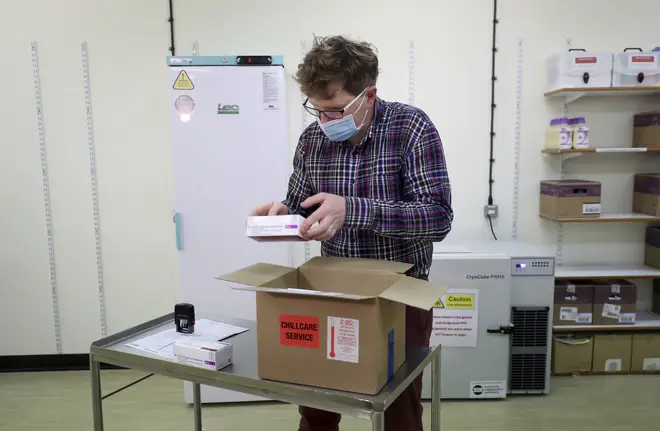
Richard Spurr 1am - 4am
3 January 2021, 07:30

Hundreds of new vaccination sites are due to be up and running this week as the NHS ramps up its coronavirus immunisation programme with the newly approved Oxford University and AstraZeneca jab.
Some 530,000 doses of the vaccine will be available for rollout across the UK from Monday, with vulnerable groups already identified as the priority for immunisation.
The jab will be administered at a small number of hospitals for the first few days for surveillance purposes, before the bulk of supplies are sent to hundreds of GP-led services to be rolled out, according to NHS England.
Read more: First Oxford Covid-19 vaccines arrive in hospitals ready for rollout
Hundreds of new vaccination sites - at both hospitals and GP-led services - are due to launch this week, joining the more than 700 already in operation, NHS England added.
Oxford University Hospitals NHS Foundation Trust, where the vaccine was developed, is expected to be among the first sites to administer it on Monday morning.

Hospitals receive the Oxford-AstraZeneca vaccine
It comes almost a month after rollout of the vaccine developed by Pfizer and BioNTech began, with more than one million people having now received their first dose.
Second doses of either vaccine will now take place within 12 weeks rather than the 21 days that was initially planned with the Pfizer/BioNTech jab, following a change in guidance which aims to accelerate immunisation.
NHS chief executive Sir Simon Stevens said: "The delivery of the Oxford AstraZeneca vaccine marks another first for the NHS, and a major milestone in humanity's battle against coronavirus."
Read more: Covid-19: UK sees new record high of 57,725 cases in 24 hours
The Oxford/AstraZeneca jab is easier to transport and store than the Pfizer/BioNTech vaccine, which needs cold storage of around minus 70C.
One of the first hospitals to take delivery of the Oxford/AstraZeneca jab on Saturday morning was the Princess Royal Hospital in Haywards Heath, part of Brighton and Sussex University Hospitals NHS Trust.
Dr George Findlay, chief medical officer and deputy chief executive at the trust, said the vaccination programme gives NHS staff "more confidence" coming into work.

Situation in health service worse now than beginning of pandemic
"We started vaccinating on our other hospital site a few weeks ago, it's been seen as a really positive step, something that gives staff more confidence to come to work," he said.
"You only have to look at the statistics over the last 10 months about how many staff have suffered illness, or sadly lost their lives.
"This gives staff the confidence to come to work to be able to look after patients."
Among the hospitals that will begin delivering the vaccine from Monday are Guy's and St Thomas' NHS Foundation Trust and Royal Free Hospital London NHS Foundation Trust.
Prime Minister Boris Johnson hailed the jab as a "a triumph of British science", adding: "From tomorrow, the NHS will start using the Oxford vaccine to give protection against Covid 19.
"We know there are challenges still ahead of us over the coming weeks and months, but I'm confident this is the year we will defeat coronavirus and start building back better."
Meanwhile, Health Secretary Matt Hancock said: "The vaccine is our way out and this huge achievement brings us a step closer to the normality we've all been working hard to reclaim.
"From tomorrow, the British public will begin to receive a second highly effective vaccine, starting with the most vulnerable and frontline care home and NHS staff, another significant milestone in the expansion of the vaccination programme.
"This will be a historic day, and cause for celebration, but it's vital everyone continues to follow the rules and remember hands, face, space, to keep ourselves and others safe."